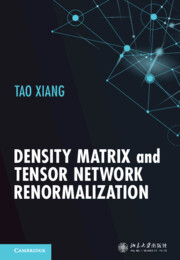Book contents
- Frontmatter
- Contents
- Preface
- Unit Used
- Notations and Graphical Representations
- Abbreviations
- 1 Introduction
- 2 Basic Algebra of Tensors
- 3 Tensor Network Representation of Classical Statistical Models
- 4 Tensor Network Representation of Operators
- 5 Tensor Network Ansatz of Wave Functions
- 6 Criterion of Truncation: Symmetric Systems
- 7 Real-Space DMRG
- 8 Implementation of Symmetries
- 9 DMRG with Nonlocal Basis States
- 10 Matrix Product States
- 11 Infinite Matrix Product States
- 12 Determination of MPS
- 13 Continuous Matrix Product States
- 14 Classical Transfer Matrix Renormalization
- 15 Criterion of Truncation: Nonsymmetric Systems
- 16 Renormalization of Quantum Transfer Matrices
- 17 MPS Solution of QTMRG
- 18 Dynamical Correlation Functions
- 19 Time-Dependent Methods
- 20 Tangent-Space Approaches
- 21 Tree Tensor Network States
- 22 Two-Dimensional Tensor Network States
- 23 Coarse-Graining Tensor Renormalization
- Appendix Other Numerical Methods
- References
- Index
12 - Determination of MPS
Published online by Cambridge University Press: 18 January 2024
- Frontmatter
- Contents
- Preface
- Unit Used
- Notations and Graphical Representations
- Abbreviations
- 1 Introduction
- 2 Basic Algebra of Tensors
- 3 Tensor Network Representation of Classical Statistical Models
- 4 Tensor Network Representation of Operators
- 5 Tensor Network Ansatz of Wave Functions
- 6 Criterion of Truncation: Symmetric Systems
- 7 Real-Space DMRG
- 8 Implementation of Symmetries
- 9 DMRG with Nonlocal Basis States
- 10 Matrix Product States
- 11 Infinite Matrix Product States
- 12 Determination of MPS
- 13 Continuous Matrix Product States
- 14 Classical Transfer Matrix Renormalization
- 15 Criterion of Truncation: Nonsymmetric Systems
- 16 Renormalization of Quantum Transfer Matrices
- 17 MPS Solution of QTMRG
- 18 Dynamical Correlation Functions
- 19 Time-Dependent Methods
- 20 Tangent-Space Approaches
- 21 Tree Tensor Network States
- 22 Two-Dimensional Tensor Network States
- 23 Coarse-Graining Tensor Renormalization
- Appendix Other Numerical Methods
- References
- Index
Summary
This chapter introduces two commonly used methods of determining the local tensors of an MPS. The first is the variational optimization method, which determines an MPS by minimizing the energy expectation value. This method is equivalent to solving a generalized eigenequation around the extreme point of the ground-state energy. The second is an update method based on an imaginary time evolution, which cools down a quantum state from finite to zero temperature. We discuss three update approaches: update via canonicalization, full update, and simple update. For an MPS, the canonicalization approach is accurate and easy to implement. However, the full and simple update can be generalized to higher dimensions and applied to, for example, PEPS. The full update is a global minimization approach. It is accurate but has a higher computational cost than the simple update. The simple update is a local optimization approach based on an entanglement mean-field approximation and is easy to implement. Finally, we discuss the purification technique and apply it to evaluate the thermal density matrix or solve a quenched disorder problem in the framework of MPS.
Keywords
Information
- Type
- Chapter
- Information
- Density Matrix and Tensor Network Renormalization , pp. 182 - 203Publisher: Cambridge University PressPrint publication year: 2023
